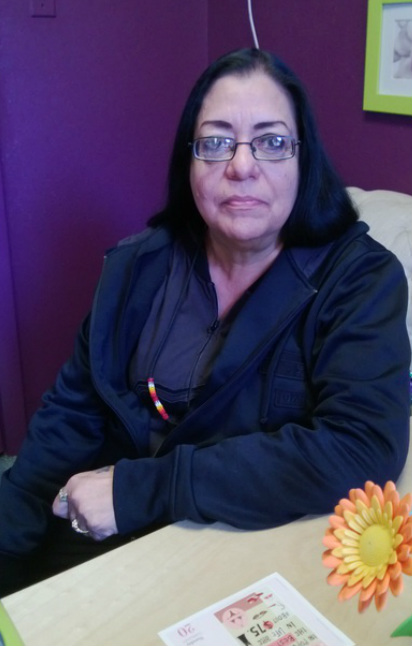"Who cares?!?!?!?!?!?!?!? no really, who will do something to help them......EVER?"
Comments from the Orchid Facebook Page Re:
Horror for a Homeless woman
 Not the scene of the crime in Colorado Springs. Not the scene of the crime in Colorado Springs.
"A homeless woman was thrown from a ledge and repeatedly raped for days at the spot where she landed beneath the Cimarron Street bridge - unable to escape because her legs were paralyzed, Colorado Springs police say. "
http://gazette.com/homeless-woman-thrown-from-bridge-raped-for-3-days-per-colorado-springs-police/article/1576589 |
|
"OMG! I'm horrified! . . . Sadly, this is not the first time that I have heard of a homeless woman being beaten & sexually assaulted, then left for dead, while living outside."
So what is the poinT?
- When we don't adequately fund housing, we're complicit in the much higher than average crime rates that homeless people experience;
- Further, there are many reasons why someone may decline psychiatric medication, AND for people who are homeless one of the number 1 reasons is as a matter of Safety -- they must keep their wits about them & medications that cause increased sleep or grogginess can be life-threatening on the street.
|
Disclosure: Ms. Romero now serves on Orchid's Advisory Board.
|
Another Horror Story Ms. Debra Romero was a middle class woman with a career and bipolar disorder. That changed after her arrest for a property crime that was years later overturned.
In the interim, she acquired post traumatic stress disorder from her ordeal in the Denver County Jail in 2006-2007, which included 229 days on the "dark side" -- solitary-- and refusal to allow her regular access to the shower. In total she was in custody for 6 years, She was released from DOC custody about 4 years ago, after winning her appeal. Approximately 3 years ago while homeless, Ms. Romero was brutally raped by two men and ended up in the hospital. Surprisingly, police were able to arrest the two men and they were prosecuted. Ms. Romero is currently living at a shelter and receives occasional mental health care at Stout Street Clinic. Ms. Romero wishes to give many, many thanks to the people at Stout Street Clinic, because as she says she believes in "giving credit where credit is due." |
An Abridged List of Orchid's Mental Health Policy Fixes:
The Devil is in the Details
The Devil is in the Details
|
1. Discharge Planning
Link to McKinney-Vento Act. http://portal.hud.gov/hudportal/HUD?src=/program_offices/comm_planning/homeless/ lawsandregs SEC. 406. [42 USC 11362]. DISCHARGE COORDINATION POLICY. The Secretary may not provide a grant under this title for any governmental entity serving as an applicant unless the applicant agrees to develop and implement, to the maximum extent practicable and where appropriate, policies and protocols for the discharge of persons from publicly funded institutions or systems of care (such as health care facilities, foster care or other youth facilities, or correction programs and institutions) in order to prevent such discharge from immediately resulting in homelessness for such persons. |
The HUD resources at left are excellent and include information regarding a state's discharge planning obligations if they receive McKinney-Vento Homeless Act funds. Those discharge planning requirements include Corrections. Colorado receives these funds. We would like to work with the State and other stakeholders to improve existing discharge planning from all institutions. |
|
This is a fantastic program funded by SAMHSA (Substance Abuse Mental Health Services Administration) that helps homeless people apply for benefits which are so desperately needed. Grossly Under-Funded |
|
3. Medicaid
In Colorado it just so happens that Medicaid services generally come with a 60% federal match. We can design services that the Centers for Medicare & Medicaid Services (CMS) will approve and adequately serve the needs of the homeless and the thousands of people with "mental illness" in Colorado's jails and prisons and in the process make our communities much safer than they are today. We also believe that Intensive Case Management is very critical for many people.
Definition of "intensive case management" under Colorado Medicaid Alternative Mental Health Care -- Intensive Case Management -- Community-based services averaging more than one hour per week, provided to adults with serious mental illness who are at risk of a more intensive 24 hour placement and who need extra support to live in the community. Services are assessment, care plan development, multi-system referrals, assistance with wrap-around and supportive living services, monitoring and follow-up. Intensive case management may be provided to children/youth under EPSDT. |
We really can't say this enough -- Colorado needs so much more in the way of Scattered Site Supportive Housing and Assertive Community Treatment (ACT).
We have used the youtube video above before, even though it is from British Columbia. Everyone in it is so eloquent. For this, we would draw your attention to the psychiatrist who observes that getting people with complex needs better is more than meds, one needs an entire system, and if the system isn't very good -- you fail to get people better. |
|
4. Adult Protection - MIA
We realize that disability advocates are not known for imploring APS to get involved.
However, in some situations we are aware of the person has tried to involve APS to no avail, or authorized us to contact APS . Ironically, the APS person asked us, "Why would you want to do something so restrictive?" BUT IT DOESN'T HAVE TO BE SO RESTRICTIVE! THERE IS NOTHING IN THE STATUTE THAT SAYS YOU CAN'T "HELP" |
We would acknowledge that APS has a lot on its plate and as with many other programs is under-funded.
Having said that we have two primary concerns: 1. APS often filters out homeless adults and adults who can live in the community AND do need their services. We are concerned that the hesitancy to serve some people can be based more on a fear of liability than an honest assessment that the person doesn't meet the criteria. We believe that "financial exploitation" of vulnerable adults should be addressed by APS, yet we are also concerned that even more dire cases are being turned away. 2. Often APS is under the impression that if the person isn't appropriate for a nursing home or guardianship -- they are not appropriate for their services. That cannot be a correct interpretation since from our perspective it would violate the Americans with Disabilities Act (ADA) and in fact an inability to access APS services leads to the unnecessary institutionalization of individuals with disabilities, including individuals with "mental illness" -- the most prominent of those institutions being jail and prison. |
|
5. General Resources
|
Colorado 2-1-1
https://211colorado.communityos.org/cms/home |
